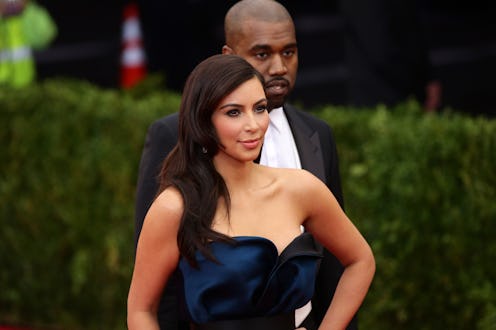Entertainment
The Sweet Side Of Kim's Race Essay
Today an interesting, relatively unexpected thing occurred in the intersecting world of reality television and cultural relations: Kim Kardashian wrote an informal essay on race on her blog. In a twist that surprised absolutely no one once they heard the words "Kim Kardashian," "wrote," "essay," and "race," there was some backlash that followed its publication. Still, though, my reaction to Kardashian's essay has tilted more towards the "oh, that was sweet" side than the strong, consistent instinct to chastise her that a lot of response posts seem to have.
I'm not saying that backlash is completely unwarranted — I've actually agreed with a lot of it. Bustle's own Lia Beck wrote a thoughtful response to Kardashian this morning, bringing in both Kardashian's and her own experience being a mixed-race person in America and pointing out that Kardashian's assertion that she'd never really thought about racism before having a mixed-race baby carries a whole lot of problems with it. And she's right; it does.
But overall, I felt a rush of affection for Kardashian when I read her essay this morning. She wrote it about the way her daughter's racial mixture has opened her eyes to the problems in the world she'd previously been privileged to turn a blind eye to — and even though, yes, it'd have been great if she'd been aware before it affected her directly, we do not live in that world. But we do live in a world where parents of mixed-race children all eventually must confront the world their kids will grow up in. And as the biracial daughter of a white woman, I feel like I can say that is a very necessary step.
My mother is nothing like Kim Kardashian: Her only appearances on television usually occurred in relation to some sort of political activity, as my mother's been an activist in issues of gender and race since the 1960s. She was aware even before she had a child with a black man (a Black Panther, no less! Not unlike Kanye West's father) what kind of world that child would be living in. But as two children of an interracial relationship, North West and I have at least one thing in common: Neither of our parents have ever fully walked in our shoes. And when it comes to the parent (yes, the non-black one) endowed with more racial privilege than the other two-thirds of the equation, any step that parent takes to fully understanding their kid's world is a healthy one.
In one episode of NBC's Parenthood the biracial kid of a black mom and a white dad asked his parents about the word "nigger" for the first time. The father tried, feebly, to properly explain the impact of that word ("It's like Voldemort, from Harry Potter!"), and so the mother explained it. It was a powerful scene, and an interesting depiction of the ways in which parents in relative positions of privilege — a la those where you don't have to think about race that often — deal with things like race and racism when the people they love are forced to grapple with it. "If that ever happened to him, [if he were ever made to feel less than human]," the father said, "it would kill me." I cry every time I watch that scene, and think back to how much worse my life would have been if my mom had been apathetic to our differences.
Kim Kardashian will never be a perfect woman. She will, in fact, likely remain an incredibly flawed public figure for the rest of her life. But she took an important parenting step today, and she did so from the rather unique position of somebody who has thousands of people listening to her. "They are all someone’s son and someone’s daughter," she wrote about Trayvon Martin, Malala Yousafzai, and Larry King. "And it is our responsibility to give them a voice and speak out for those who can’t."
Kim Kardashian is no doubt an imperfect woman. But if I were North West I'd be damn proud of my mom today.
